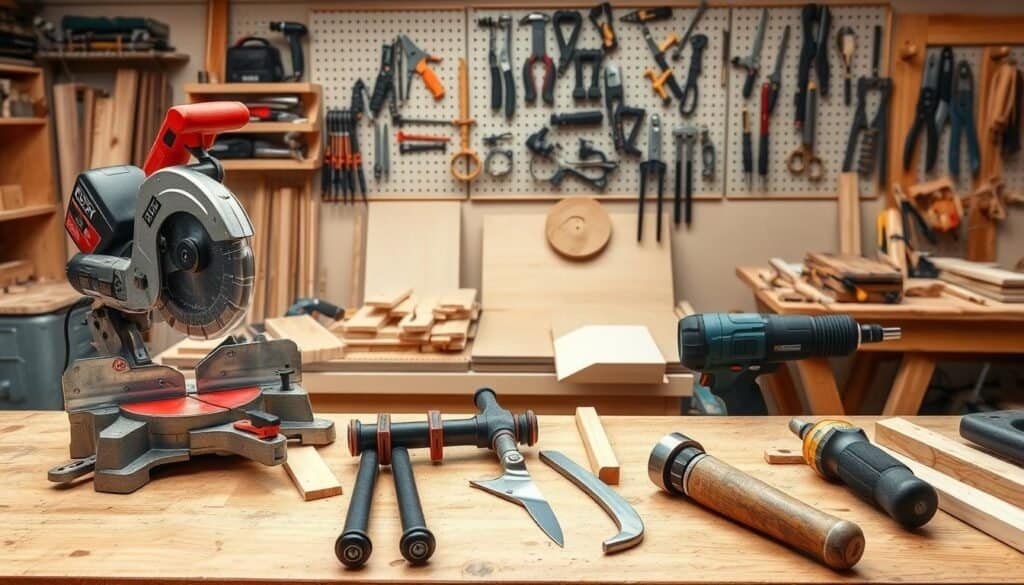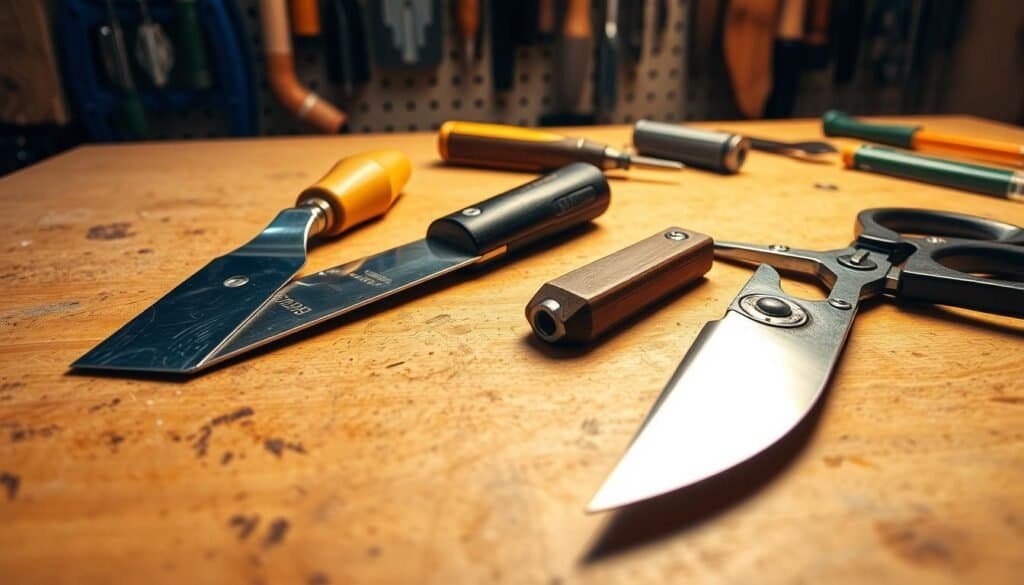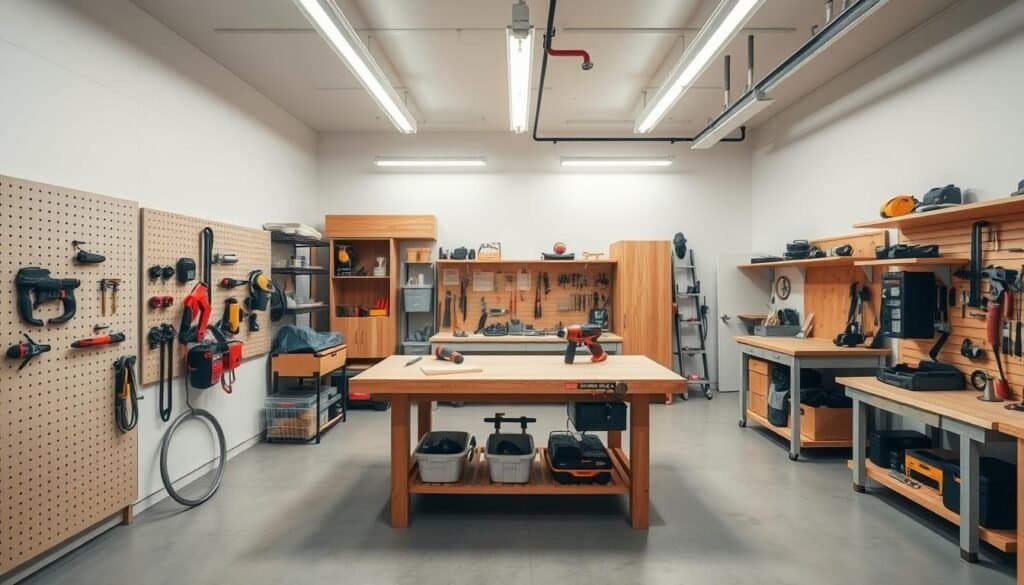Starting as a woodworker means you need the right tools. These tools help you build projects with confidence. Knowing the essential woodworking tools is the first step.
It’s important to buy tools that will last for years. This guide will show you the must-have woodworking tools for beginners.
With the right beginner woodworking equipment, you can do many projects. You’ll go from simple to complex tasks. This will improve your skills over time.
Getting Started in Woodworking: What You Really Need
Starting in woodworking can be exciting but also overwhelming. There are so many tools and equipment out there. But, knowing the basic tools is key to getting started.
Don’t worry, you don’t need a lot of tools to begin. A good beginner’s tool kit should have the basics. You’ll need a tape measure, a square, a pencil, and a hand saw. These are the core tools for your woodworking journey.
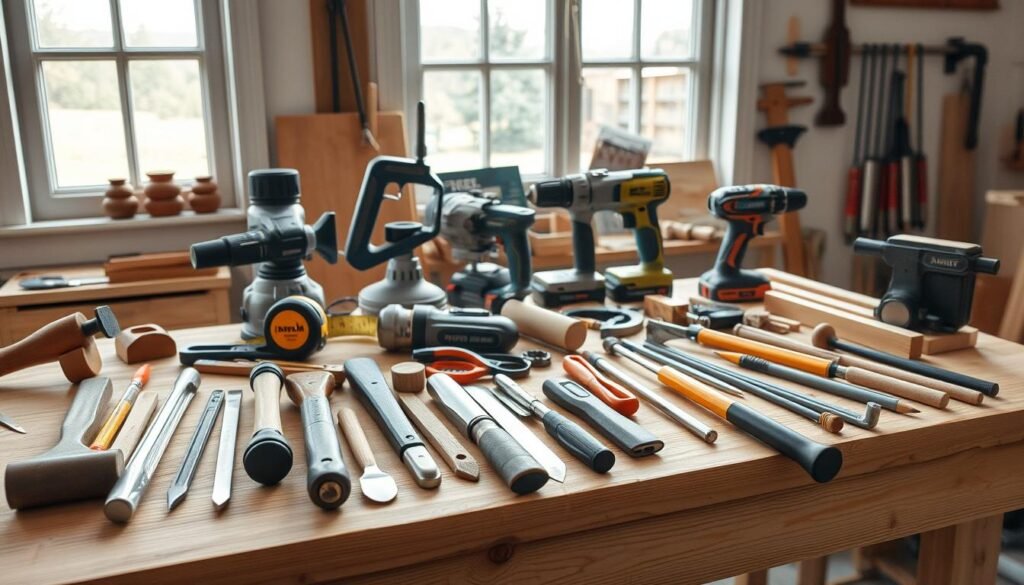
It’s better to invest in quality tools than to buy a lot of cheap ones. Choose a few essential tools that are well-made and last long. This way, you save money and have success with your first projects, boosting your confidence.
Knowing what tools you really need is important for a good start. Start with the must-haves and add more as you go. This will make your woodworking experience enjoyable and rewarding.
Tools Every Beginner Woodworker Needs in the Shop
Starting your woodworking journey needs a solid base of beginner-friendly tools. It’s important to choose tools that are versatile and easy to use.
Think about the projects you want to do when building your tool collection. A Dremel is great for detailed work, with many dremel wood carving ideas to explore.
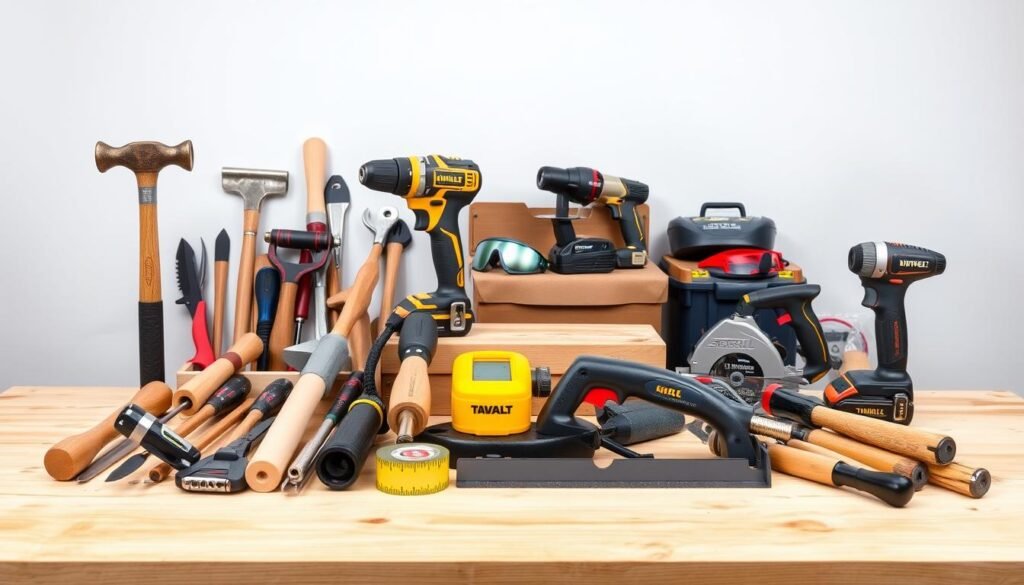
Wood carving enthusiasts will find wood carving patterns templates very helpful. These templates guide you, helping you create precise and detailed designs.
As you get better, your tool collection will grow. Start with the basics and add more specialized tools as you go. This way, you’ll always be ready for new projects.
Measuring and Marking Tools: The Foundation of Accuracy
Measuring and marking tools are key for woodworking projects. They ensure precision and accuracy. For beginners, these tools are essential. They help make projects look good and be strong.
A tape measure is a must-have for measuring. It helps woodworkers get accurate lengths and widths. Calipers are needed for even more precise measurements. They are vital for detailed wood carving patterns.
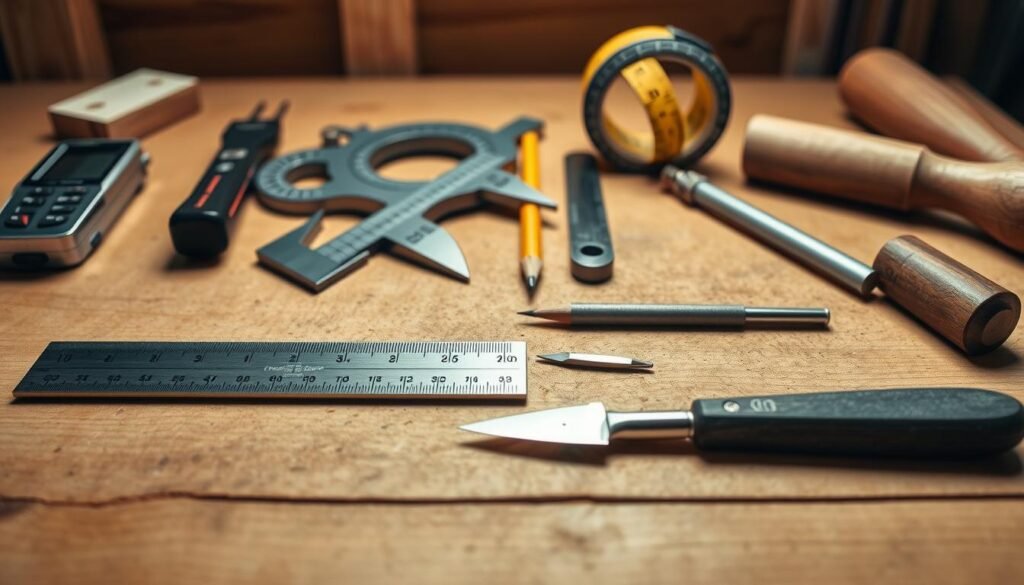
Choosing the right tape measure is important. A 25-foot tape measure works well for most beginner projects. Look for one with a lock and a comfortable grip.
Accuracy Considerations
Getting accurate measurements is key. Make sure tools are calibrated right and used correctly. For dremel wood carving, precise markings are essential.
In summary, measuring and marking tools are vital for woodworking. By picking the right tools and knowing their features, beginners can get better. They can make everything from simple wood carvings to complex designs using free wood carving patterns.
Essential Hand Saws for Beginners
Beginner woodworkers often wonder which hand saws are must-haves for their toolkit. Hand saws are key tools for making precise cuts in wood. It’s wise for beginners to start with the basics and add more as they get better.
The handsaw is a versatile tool for beginners. It’s great for cross-cutting and ripping wood. It’s perfect for simple projects like wooden decorations or toys. A coping saw is also useful for curved cuts and detailed work, often seen in dremel crafts for beginners.
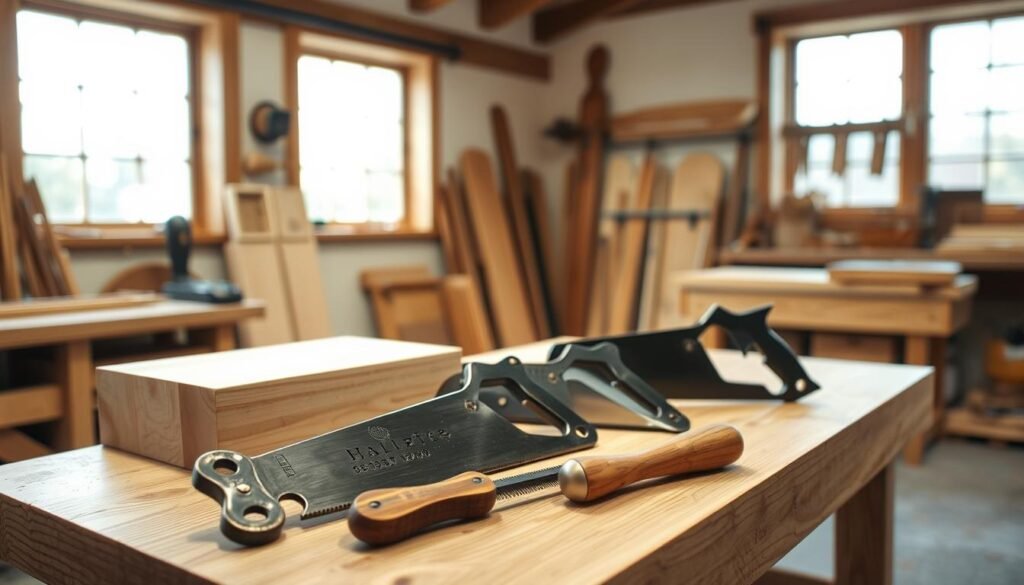
A dovetail saw is ideal for more detailed projects. It’s used for precise angled cuts, common in fine woodworking and wood carving for beginners. A simple pruning saw is also good for rough cuts and demo work. As you get better, you can explore more specialized saws.
Exploring easy wood carving ideas is a great way to use hand saws. Simple projects like wooden spoons or small decorative boxes are great for practicing. As you get more confident, you can tackle more complex projects that need precision and patience.
In conclusion, having the right hand saws is key for beginner woodworkers. By starting with the basics and practicing often, you can handle a variety of projects. From simple whittling to complex wood carvings, you’ll be ready.
Must-Have Chisels and Hand Planes
Chisels and hand planes are key tools for woodworkers. They help in many tasks, from simple wood carving to detailed joinery.
Chisels are great for removing small wood pieces and for detailed work, like in whittling. Hand planes, on the other hand, smooth out wood surfaces. This makes them vital for a top-notch finish.
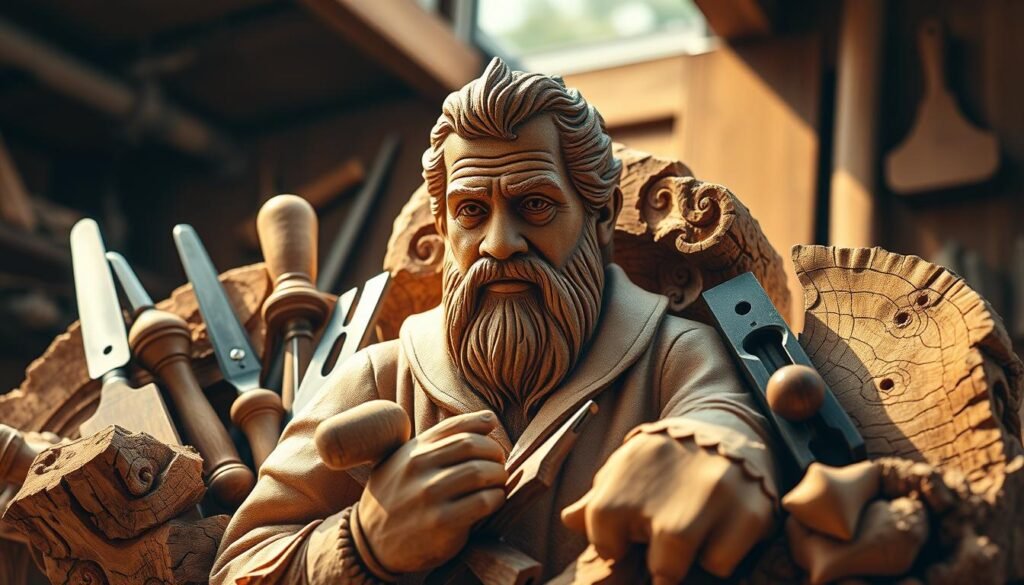
A block plane is very useful for smoothing small wood areas and removing old finishes. It’s a must-have for woodworkers, perfect for dremel crafts needing precision.
Smoothing Plane
A smoothing plane is used to even out and smooth large wood surfaces. It’s essential for a professional finish in woodworking, including wood carving art sculpture.
In summary, chisels and hand planes are must-haves for woodworkers. Investing in quality chisels and hand planes ensures projects are done well. This is true for both simple whittling projects and more complex woodworking tasks.
Power Tools Worth the Investment
For beginner woodworkers, knowing which power tools to invest in is essential. These tools can greatly improve your work’s quality and detail. They make tasks easier and more efficient.
The Dremel is a versatile tool for woodworking. It’s great for dremel wood carving, allowing for detailed designs and patterns. With a Dremel, you can make cuts and shapes that hand tools can’t.
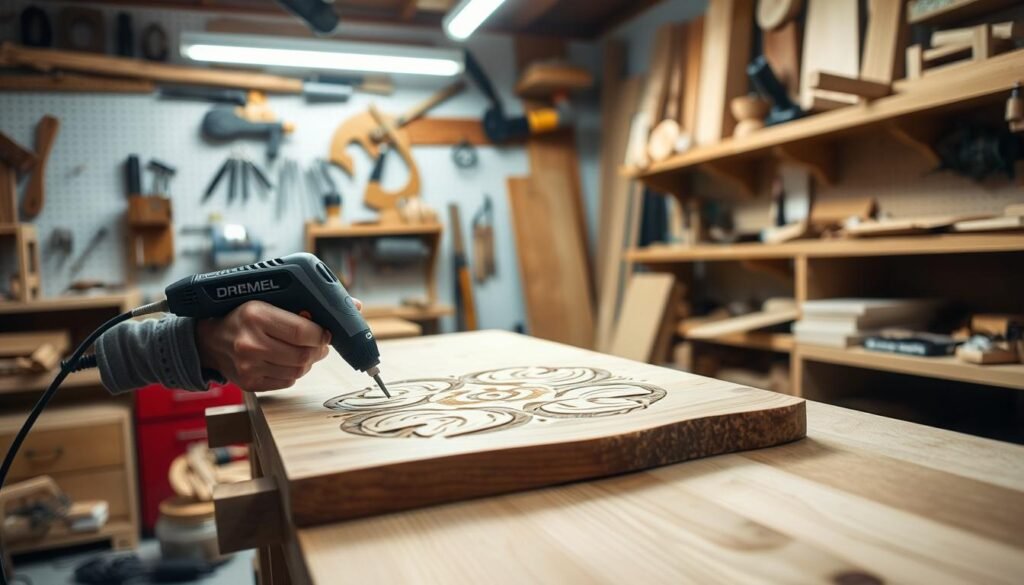
For wood carving for beginners, starting with simple designs is key. Simple wood carving patterns help you build your skills. As you get better, you can move to more complex wood carving designs.
Table saws, routers, and bandsaws are also good investments. They help you make precise cuts and create joints. These tools are vital for expanding your woodworking skills.
In conclusion, power tools may seem expensive at first. But, their long-term benefits in quality, efficiency, and complexity make them worth it. As you continue woodworking, choosing the right power tools for your needs is important.
Clamps and Work-Holding Solutions
For woodworkers, the right clamps and work-holding solutions are key. They help you get professional results in your projects. Clamps apply the needed pressure to keep your workpieces steady, making cuts and joinery precise.
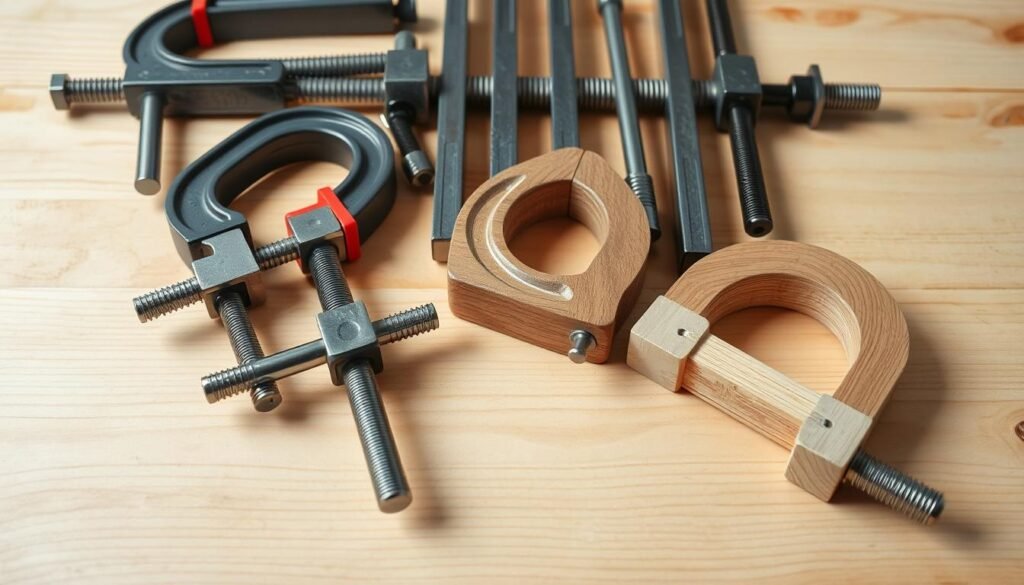
There are many types of clamps useful for woodworking. F-Clamps and Bar Clamps are among the most versatile. They’re great for a wide range of tasks.
F-Clamps and Bar Clamps
F-Clamps have an F-shaped design for even pressure on various sizes of workpieces. Bar Clamps are longer, perfect for bigger projects. Both are essential for tasks needing strong clamping, like gluing panels or assembling complex pieces.
Quick-Release Clamps
Quick-Release Clamps are handy for fast clamping and unclamping. They’re great for projects needing frequent adjustments or when using homemade tools.
Adding these clamps to your toolkit will help you tackle various woodworking projects with ease and precision.
Finishing Tools and Supplies
To get a professional finish, every beginner woodworker needs the right tools and supplies. Finishing is key in woodworking. It protects the wood and makes it look better.
For easy projects, a basic set of finishing tools is needed. This includes sandpaper in different grits, sanding blocks, and a dust mask. A well-stocked carpentry workshop is essential for a smooth finish.
When planning your wood workshop, think about the finish you want. You might need stains, varnishes, or polyurethane. Also, having the right tools like brushes, rags, or foam pads is important.
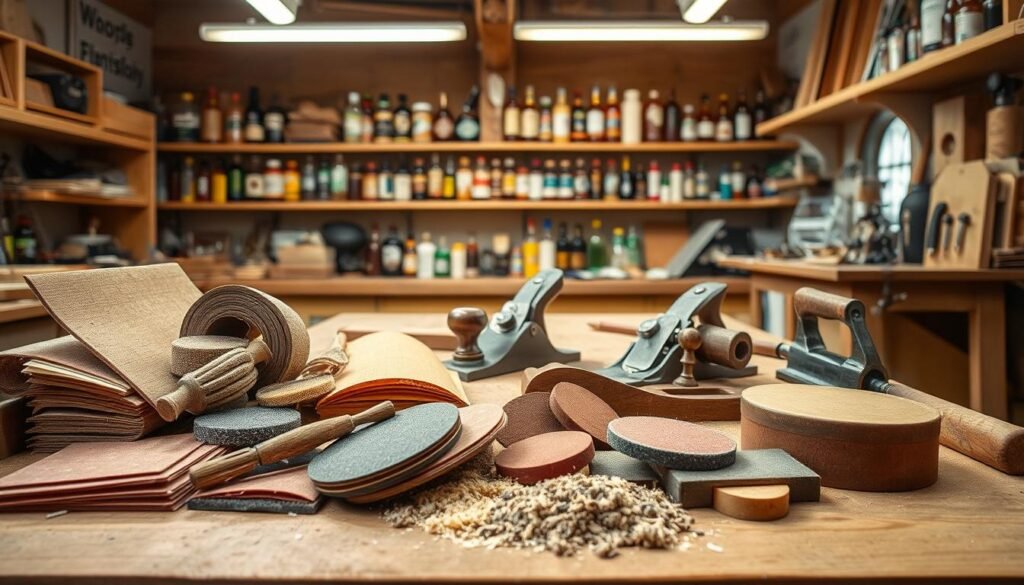
For woodshop projects, paying attention to detail in finishing is vital. Make sure your work surface is clean and ready before applying any finish. This ensures a professional look.
Investing in the right tools and supplies can greatly improve your projects. It makes them look more polished and professional.
Safety Equipment: Non-Negotiable Essentials
As a beginner woodworker, getting the right safety gear is key. It keeps you safe from dangers. Safety equipment is a must for a safe place to work.
Important safety gear includes eye protection, ear protection, and dust masks. They protect you from flying debris, loud sounds, and breathing in wood dust.
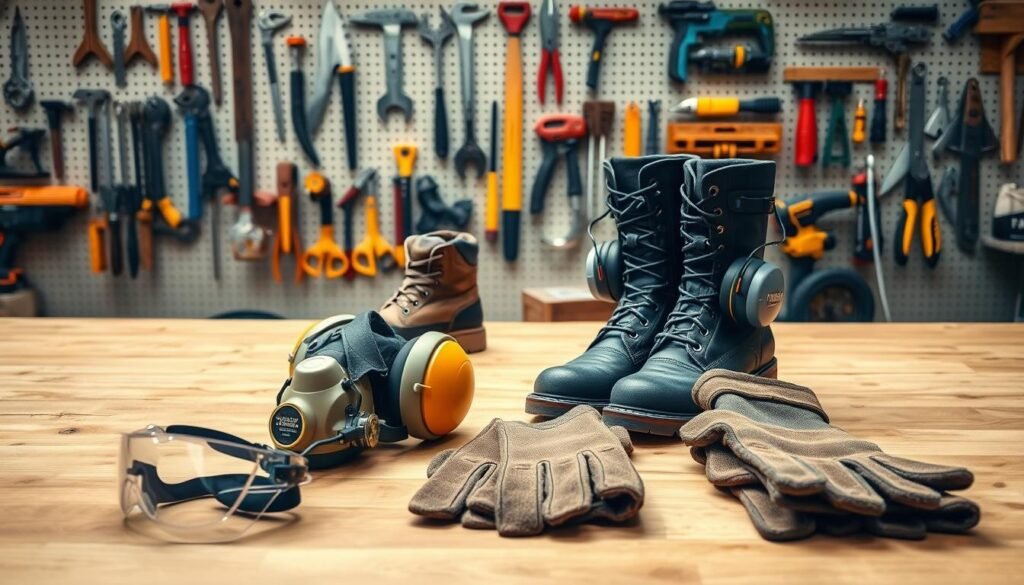
Also, following “woodworking tips and tricks” can make your workspace safer. For example, a tidy workshop lowers the chance of accidents from tripping or losing tools.
Some woodworkers also make their own safety tools or holders. This makes their safety gear more personal.
In the end, safety gear and practices are the base of a safe and successful woodworking journey.
Joinery and Assembly Tools
To get professional results in woodworking, knowing your joinery and assembly tools is key. These tools help make strong, lasting joints. They’re essential for any project, big or small, like a simple DIY wood project or a complex piece of furniture.
For projects like a wooden pen holder design or handcrafted wooden pencil holders, the right tools are a must. They ensure the pieces fit together perfectly. This boosts the project’s look and function. For example, a simple wooden pencil holder needs precise joinery for stability.
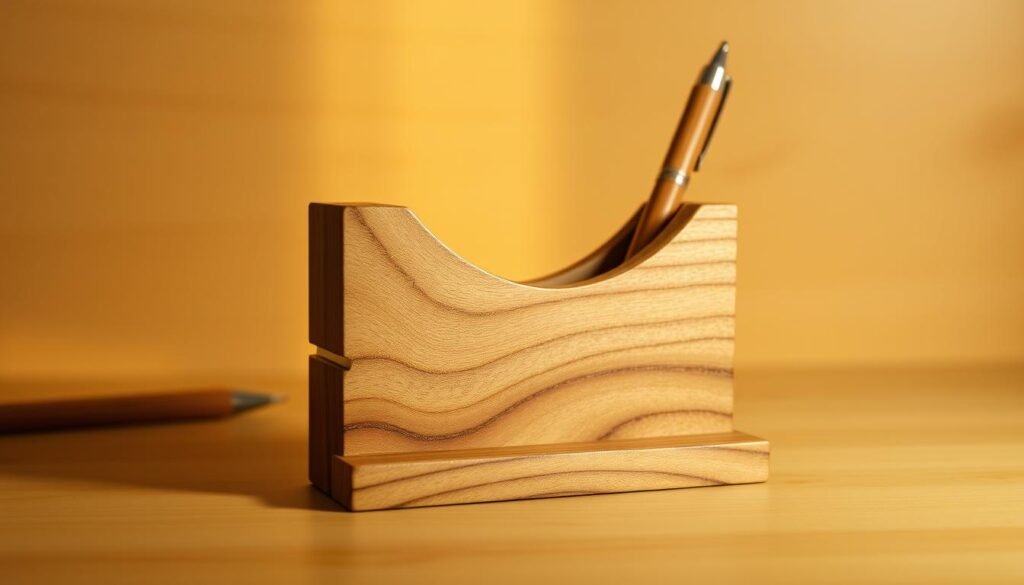
Joinery and assembly tools are also vital for bigger, more complex designs. A wooden phone stand with pen & pencil holder/pot is a great example. The precision these tools offer is essential for a top-notch finish.
In short, joinery and assembly tools are critical for woodworking success. With the right tools and techniques, you can improve your skills. This way, you can make beautiful, functional pieces that last a long time.
Conclusion: Building Your Woodworking Journey One Tool at a Time
Starting your woodworking journey takes patience, dedication, and the right tools. You’ve learned that having the essential tools is key. This is true for both plywood projects and other wood crafts.
Having a well-organized woodworking shop is important. It makes your work more efficient and safe. By getting the right tools and setting up your space, you’ll make beautiful woodwork.
Remember, building your tool collection takes time. Start with the basics and add more tools as you go. This way, you can try out different techniques and projects.
With the right tools and creativity, you can do anything. From making fancy furniture to creating smart tiles for your home.

